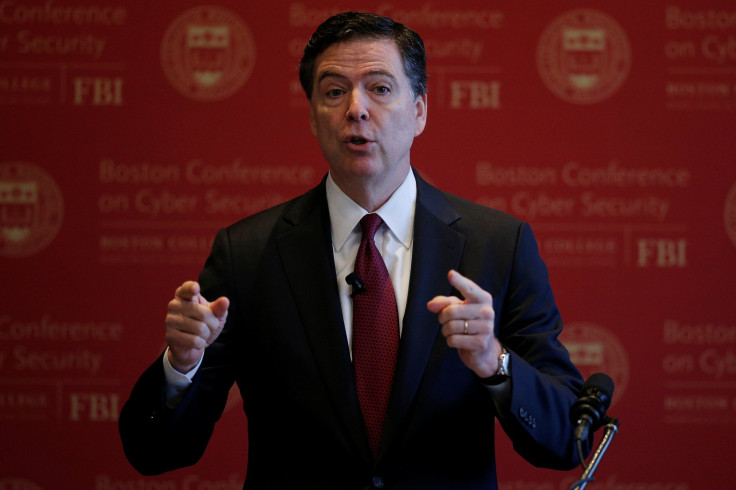WikiLeaks Vault 7 Leaks Effect: FBI Director Comey Says 'There Is No Such Thing As Absolute Privacy In America'

FBI director James Comey Wednesday sounded an ominous warning for all U.S. citizens. Speaking at the Boston Conference on Cyber Security at Boston College, he stated, “there is no such thing as absolute privacy in America."
His remarks have been made in the background of the recent WikiLeaks’ Vault 7 CIA documents dump, which revealed that law enforcement agencies had gone beyond legal boundaries to snoop into iOS and Android users phones. Although, he did not mention the WikiLeaks post, or even President Donald Trump’s recent claim that the Obama administration had wiretapped the Trump Tower.
"Even our communications with our spouses, with our clergy members, with our attorneys are not absolutely private in America. In appropriate circumstances, a judge can compel any one of us to testify in court about those very private communications," Comey added.
Comey's justification of his claim that there is no “absolute privacy” is that — legally a court can compel people to give testimony from their memory of private conversations. He wants to apply the same doctrine to digital evidence such as phone records, text messages, emails and other digital communication.
Although, Vault 7 is nowhere mentioned in his speech, he claimed that between October and December 2016, the agency tried to access data on 2,800 devices, out of which, it was able to access it only on 1,200.
Contradicting himself, he also said, “We all value privacy. We all value security. We should never have to sacrifice one for the other."
The fact, though is that, the agency has not produced any court order justifying the Vault 7 snooping nor has it denied it was involved in such activities. The speech could be interpreted as Comey’s way of justifying the agency’s intrusion and undue oversight of citizens’ data.
This is not the first time that the law enforcement agencies have had undue access to citizens’ data. In 2013, former CIA employee Edward Snowden revealed that the National Security Agency had been running global surveillance program and apart from spying on citizens’ emails, the agency had been spying on many foreign governments. His disclosures initiated debate on the extent of government reach over private data and the balance between national security and information privacy, which is still on.
The law enforcement agencies’ own views on privacy seem conflicting. The Office of the Director of National Intelligence and the Department of Homeland Security in October accused the Russian government of hacking into the Democratic National Party’s emails to influence the 2016 presidential election.
On one hand, they are steering clear of providing citizens any assurance of privacy, but when a foreign government is alleged to do the absolute same with a political party, they raise protests and accusations. No conclusive evidence has come up yet to verify the agencies’ claims.
While the interference into citizen’s private data has been justified as a security measure, private data collation by agencies sets a dangerous trend since it makes citizens susceptible. The data could be easily hacked into and used for malicious purposes.
Even as the interference into citizen’s private data has been justified as a security measure, private data collation by agencies sets a dangerous trend since it makes citizens susceptible. The data could be easily hacked into and used for malicious purposes.
While spying on its own citizens has been prevalent in the past in countries such as the soviet-era Russian regime. The “protector of the free world” is being hypocritical at its best.
© Copyright IBTimes 2024. All rights reserved.





















